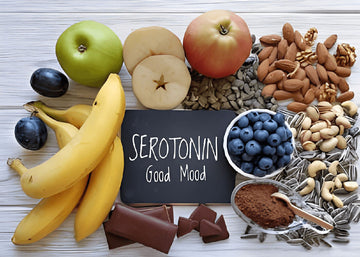What is serotonin?
Serotonin, is one of the four human "happy chemicals", often dubbed the "feel-good" neurotransmitter, is crucial for mood regulation, sleep patterns, appetite control, and more. A deficiency in serotonin can lead to stress, anxiety, and mood swings. Understanding how to naturally enhance serotonin levels can be a game-changer for managing stress and improving overall well-being.
-
Mood Regulation: Serotonin is best known for its role in influencing mood. Adequate levels are associated with feelings of happiness and well-being, while low levels are linked to mood disorders like depression.
-
Sleep Regulation: It helps regulate sleep cycles by contributing to the production of melatonin, the hormone responsible for sleep-wake cycles.
-
Appetite Control: Serotonin impacts appetite, playing a role in reducing hunger and regulating eating behaviors.
-
Digestive Function: It is also found in the gastrointestinal tract, where it helps regulate bowel movements and function.
-
Pain Management: Serotonin can affect how the body perceives pain, which is why some pain medications and certain antidepressants target serotonin levels.
-
Cognitive Functions: It influences memory and learning capabilities.
Overall, serotonin is essential for many bodily functions, and maintaining balanced levels is important for physical and mental health.
How Stress Affects Serotonin and Ways to Counteract It
Stress can significantly impact serotonin levels in our body, leading to mood swings, anxiety, and depression. It's a vicious cycle where stress depletes serotonin, and low serotonin levels make us more susceptible to stress. But don't worry, there is a solution for everything.
When you're stressed, your body responds by releasing stress hormones like cortisol. This hormonal surge can disrupt the balance of serotonin in the brain. As a result, the production and function of serotonin can be reduced, leading to lower levels in the brain.
Stress can deplete serotonin levels, making us more susceptible to mood disorders. Factors like diet, exercise, and certain supplements can help in rebalancing these levels. Let’s explore some effective natural supplements for boosting serotonin.
Serotonin-Boosting Supplements: Natural Solutions
-
Tryptophan and 5-HTP: These amino acids are direct precursors to serotonin. Supplements containing these can effectively raise serotonin levels, improving mood and stress response.
-
Omega-3 Fatty Acids: Found in fish oils, these acids help increase the activity and sensitivity of serotonin receptors.
-
Magnesium: This mineral aids in reducing the reuptake of serotonin in the brain, enhancing its availability.
-
Herbal Remedies: Herbs like St. John's Wort, Rhodiola Rosea, and Ashwagandha can indirectly support serotonin levels by reducing stress.
Natural Supplements and Vitamins for Serotonin Boost
-
Vitamin B6 (Pyridoxine)
This vitamin is vital for the synthesis of serotonin. It helps convert the amino acid tryptophan into serotonin. A deficiency in Vitamin B6 can lead to decreased serotonin production, affecting mood and potentially leading to depression.
-
Vitamin B12 (Cobalamin)
While Vitamin B12 doesn't directly participate in the synthesis of serotonin, it's important for maintaining a healthy nervous system and aiding in the overall process. A deficiency in B12 can lead to mood disturbances and cognitive issues.
-
Vitamin D
Often called the "sunshine vitamin," Vitamin D plays a significant role in the regulation of serotonin. Research has shown that Vitamin D can influence the expression of serotonin-related genes and its receptors in the brain. Low levels of Vitamin D have been linked to mood disorders like depression.
-
Folate (Vitamin B9)
Folate is another B vitamin that's important for serotonin production. It helps in the metabolism of amino acids that are precursors to neurotransmitters like serotonin. Low levels of folate are often observed in individuals with depression.
-
Vitamin C
While not directly involved in the synthesis of serotonin, Vitamin C plays a supportive role. It's essential for overall brain health and function, and it helps in the conversion process of tryptophan to serotonin.
Herbal Remedies and Serotonin: Popular Herbal stress relievers
These herbs help to increase serotonin levels in an indirect way promoting a sense of calmness and reducing stress in the body and mind.
-
St. John's Wort
Perhaps the most well-known herb for mood regulation, St. John's Wort is believed to increase the levels of neurotransmitters, including serotonin, in the brain. It's commonly used for mild to moderate depression.
-
Rhodiola Rosea
This herb is known for its adaptogenic properties, helping the body resist physical, chemical, and environmental stress. Rhodiola is thought to enhance serotonin production and can help improve mood and alleviate stress.
-
Ashwagandha
Another adaptogen, Ashwagandha, is used in Ayurvedic medicine to help balance stress hormones and improve mood. It's believed to indirectly support serotonin levels by reducing stress.
-
Ginseng
Ginseng has been used in traditional Chinese medicine to improve overall health and vitality. It's thought to have a positive effect on mood and brain function, potentially influencing serotonin levels.
-
Chamomile
Often used in tea, chamomile is known for its calming effects. It's believed to help with anxiety and stress relief, possibly by modulating serotonin and other neurotransmitters in the brain.
-
Lavender
Lavender is widely used for its calming and relaxing properties. It's thought to impact mood and might indirectly affect serotonin levels by reducing stress and anxiety.
-
Griffonia Simplicifolia
This West African plant is a natural source of 5-HTP, a precursor to serotonin. Supplements made from Griffonia Simplicifolia are often used to improve mood and sleep patterns. -
Other Adaptogens
Learn more about the Top 5 Adaptogen Supplements for Stress Relief.
How to boost serotonin release?
Serotonin, often referred to as the "feel-good" hormone, plays a critical role in regulating mood, emotions, and sleep. Enhancing its levels can lead to a more positive outlook and a general sense of well-being. Here are some natural and accessible methods to achieve this:
Boost serotonin through Exercise
Regular exercise is a fantastic way to boost serotonin levels. When you engage in physical activities, your body releases endorphins, known as 'happy hormones,' which can significantly improve your mood. Activities like brisk walking, jogging, swimming, or even dancing can uplift your spirits. The beauty of exercise is its versatility – you can choose an activity that you truly enjoy and fits your lifestyle.
Light Therapy increases serotonin?
Light, especially sunlight, has a profound effect on your mood. Exposure to natural light can increase the production of serotonin in your brain. If you can't get outside, consider light therapy, which involves sitting near a device called a light therapy box. This can be especially beneficial during the winter months or in regions with limited sunlight.
Diet and Serotonin: Foods to Enhance Serotonin Levels
A balanced diet is key to maintaining healthy serotonin levels. Foods rich in tryptophan, such as turkey, nuts, cocoa, and cheese, can boost serotonin production.
Also, a diet high in fiber isn't just good for digestion; it also benefits your mental health. Fiber-rich foods, such as fruits, vegetables, and whole grains, help promote a healthy gut. A well-functioning gut is essential for serotonin production, as a significant portion of this hormone is actually produced in the digestive tract.
Serotonin supplements: beyond stress relief
Serotonin supplements do more than just help with stress. They include ingredients like GABA, Vitamin B6, D3, Tryptophan, and 5-HTP. These ingredients work together to improve your mood, help you sleep better, and control your appetite. They affect the chemicals in your brain to help you feel more balanced and overall happier. So, these supplements are not just for stress; they support many parts of your mental health and well-being.
OUR RECOMMENDATION:
https://ethicherbs.com/products/theanine-with-ashwagandha-tryptophan-serotonin-supplement-for-stress
Probiotic Supplements and The Gut-Brain Connection
Probiotics, found in supplements and fermented foods like yogurt, kefir, and sauerkraut, are known for their beneficial effects on gut health. A healthy gut flora is linked to better mood and reduced stress levels. Taking probiotic supplements or including fermented foods in your diet can help maintain this balance.

Through Yoga and Mindfulness to improve Serenity and Calm
Yoga and mindfulness are more than just physical activities; they are practices that involve the mind and spirit. Engaging in yoga helps in releasing tension and stress, promoting relaxation, and consequently, boosting serotonin levels. Similarly, mindfulness and meditation practices can reduce stress and anxiety, paving the way for a happier and more serene state of mind.
Lifestyle Changes for Better Serotonin Balance
Sometimes, incorporating lifestyle changes is necessary. Things like improving sleep patterns, reducing screen time, and social media lead to better serotonin levels.
Stress management techniques like breathing exercises or meditation, and a balanced diet can significantly improve serotonin levels.
Small Actions, Big Impact
Even small changes in your daily routine can contribute to better mood and mental health. Simple activities like taking a walk in nature, enjoying a hobby, or spending time with loved ones can uplift your spirits. Remember, it's about finding joy and peace in the little things.
In conclusion, boosting your serotonin levels and overall mood can be achieved through a combination of physical activities, dietary choices, and mental wellness practices. By incorporating these methods into your daily life, you can enjoy a more balanced and joyful state of being. Remember, it's important to find what works best for you and to consult with healthcare professionals when making significant changes to your lifestyle or diet.
Serotonin secrets and frequently asked questions
What are the best natural supplements for boosting serotonin?
St. John's Wort, Tryptophan, Omega-3 fatty acids, Vitamins B6 and D3, and 5-HTP are among the most effective.
Can diet affect serotonin levels?
Yes, foods rich in tryptophan can enhance serotonin production.
Are there any risks associated with serotonin supplements?
Natural and synthetic supplements can have side effects; it's important to consult a healthcare provider.
How does exercise influence serotonin levels?
Regular physical activity increases serotonin production, improving mood and reducing stress.
Can lifestyle changes alone manage serotonin levels effectively?
While supplements can be helpful, lifestyle changes like diet, exercise, and stress management play a crucial role in maintaining serotonin balance.
What are the best vitamins for increasing serotonin levels in cases of chronic stress?
Vitamins B6, B12, and D are particularly effective in boosting serotonin levels, especially in individuals with chronic stress.
How can herbal remedies enhance serotonin production for better mental health?
Herbal remedies like Ashwagandha and Rhodiola Rosea are known for improving mental health by enhancing serotonin production and alleviating stress.
Are there specific exercises recommended for boosting serotonin to alleviate anxiety?
Activities like yoga, aerobic exercises, and even brisk walking are highly recommended for increasing serotonin levels, which can help in reducing anxiety symptoms.
Can a serotonin-rich diet help in managing depression symptoms naturally?
A diet rich in tryptophan-containing foods, such as turkey, nuts, and cheese, can naturally boost serotonin levels and may aid in managing symptoms of depression.
What should be considered when choosing between natural and synthetic serotonin supplements for stress relief?
When deciding between natural and synthetic options for stress relief, factors like individual health conditions, potential side effects, and the specific needs of your body should be considered. Consulting with a healthcare professional is also crucial for making an informed decision.








